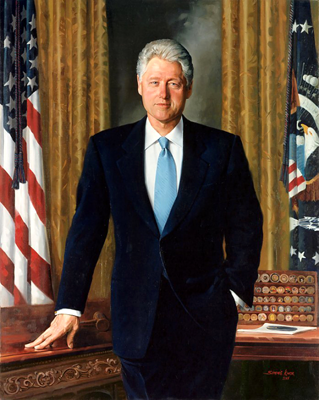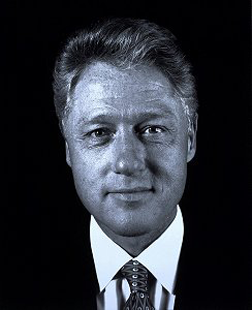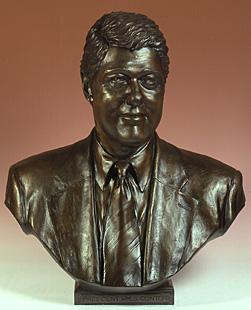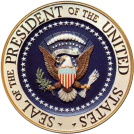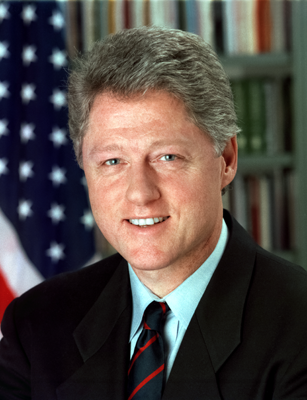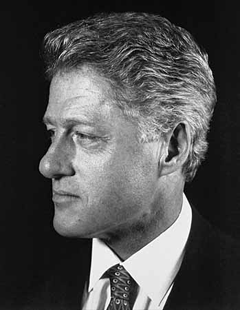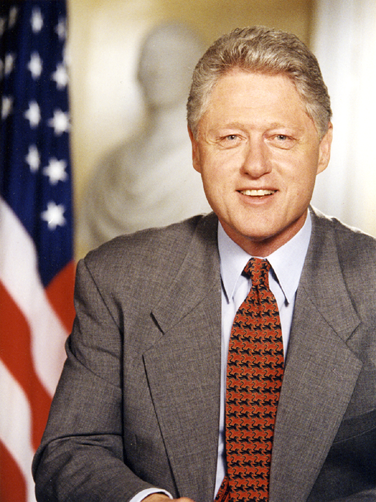|
BILL CLINTON |
|
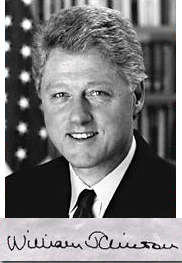
THE 42ND PRESIDENT OF
THE UNITED STATES OF AMERICA
(1993-2001)
CLINTON, Bill
, full name, William Jefferson Clinton, (1946– ), 42nd president of the U.S. (1993–2001).Clinton was born William Jefferson Blythe IV in Hope, Ark., on Aug. 19, 1946. Clinton’s father, William Blythe (1918–46), died in an automobile accident before his son was born; as a teenager, Bill legally changed his surname to that of his stepfather, Roger Clinton (1913–67). He graduated from Georgetown University in 1968, attended Oxford University on a Rhodes Scholarship (1968–70), and earned his law degree at Yale University (1973). At Yale he met Hillary Rodham, also a law student, and they were married in 1975. Their daughter, Chelsea Victoria, was born in 1980.
After running unsuccessfully for the U.S. House of Representatives in 1974, Clinton was elected attorney general of Arkansas in 1976; two years later, at age 32, he won election as the nation’s youngest governor. Defeated in 1980, he regained the governorship in 1982 and was reelected in 1984, 1986, and 1990 (during this period Arkansas changed the governor’s term from two to four years). In 1992, campaigning as a centrist and emphasizing domestic economic reform, he won the Democratic presidential nomination and, with his running mate, Al Gore, defeated Republican incumbent George H. W. Bush and independent H. Ross Perot in the 1992 election.
Clinton’s First Term.
Clinton took office in 1993 with a crowded domestic agenda. Although Democrats controlled both houses of Congress, Clinton’s economic stimulus package was dealt an early defeat. Legislators narrowly passed his budget-reform measure, which increased taxes and cut national-defense and other expenditures to reduce deficit spending. Bills for increased and family leave for workers also passed, and the North American Free Trade Agreement was ratified. Clinton signed executive orders easing abortion restrictions and modifying the ban on homosexuals in the military. In 1994 he won passage of new anticrime legislation, but a health-care reform bill, based on the recommendations of a task force headed by the First Lady, died in Congress. From 1994 onward, both Clintons faced intense financial and legal scrutiny regarding their involvement with the Whitewater Development Corp., an Arkansas real estate venture that failed in the ’80s. An independent counsel was appointed to investigate the Whitewater scandal.
In foreign affairs, Clinton encouraged the Middle East peace process, won congressional approval for aid to Russia and other former Soviet republics, ended the 19-year ban on U.S. trade with Vietnam, and sent troops to Haiti to restore President Jean-Bertrand Aristide (1953– ) to power; the Clinton administration also continued to cultivate relations with China. The continuing war in Bosnia, the chronic U.S. trade deficit with Japan, and a series of crises in Africa were among the problems encountered. Clinton sent more than 20,000 American troops to Bosnia to help enforce a peace accord brokered by U.S. officials in Dayton, Ohio, in November 1995.
Clinton’s low approval rating among U.S. voters contributed to the Democrats’ election losses in 1994 and left him facing a Republican-controlled Congress. Partisan wrangling over the federal budget and other issues produced few legislative accomplishments in 1995. As the 1996 elections approached, Congress passed and Clinton signed a series of measures that transformed the U.S. welfare system, guaranteed continuing health-care coverage for workers who changed jobs, cracked down on illegal immigration, and raised the minimum wage.
The 1996 Campaign.
Despite the controversy over Whitewater, as well as the 1993 firing of the White House travel office staff and the administration’s mishandling of Federal Bureau of Investigation files, which had been added to the investigation, President Clinton and Vice-President Gore were renominated without opposition in August 1996. In the general election campaign against Bob Dole, the Republican presidential nominee, and Perot, the candidate of the Reform party, Clinton promoted his administration’s success in creating jobs, controlling inflation, and reducing the federal budget deficit. He attacked Dole’s plan for a 15-percent across-the-board tax cut as a "risky scheme," and he pledged to protect Medicare, Medicaid, education, and the environment from excessive budget cuts. After leading in public opinion polls throughout the campaign, Clinton won in November with about 49 percent of the popular vote. He thus became the first Democratic president in 60 years to win election to two successive terms.
Clinton’s Second Term.
Immediately after the election, a series of resignations left Clinton with the task of replacing numerous high-level appointees, including his chief of staff and the secretaries of state and defense. His victory was also clouded by reports that congressional committees and the U.S. Justice Department were investigating whether Democrats had engaged in illegal fund-raising practices and had improperly solicited foreign contributions. Hobbled by surgery to repair an injury to his knee, he nevertheless traveled to Helsinki, Finland, in March 1997 for a summit meeting with Russian President Boris Yeltsin. The U.S. Supreme Court dealt Clinton a legal and political setback when it ruled, in May, that he could not postpone until he left the White House a civil lawsuit that charged him with sexually harassing Paula Corbin Jones (1966– ) while he was governor of Arkansas and she was a state employee. In August Clinton signed a compromise budget measure that included large cuts in taxes and spending; the following February, he became the first president in nearly 30 years to submit a balanced federal budget to Congress.
Largely because of the booming economy, Clinton’s popularity soared in early 1998, despite a new scandal involving allegations that he had had a sexual relationship with a White House intern, Monica Lewinsky (1973– ), and then urged her to deny it in an affidavit submitted in the Paula Jones case. Although Jones’s lawsuit was dismissed by U.S. District Court Judge Susan Webber Wright (1948– ) in April and an appeal dropped in mid-November as part of an out-of-court settlement that obligated the president to pay Jones $850,000, inquiries into the other allegations against Clinton and other present and former members of his administration continued.
With his domestic agenda stalled in Congress, the president took an active part in foreign policy during the first half of 1998. He played an influential role in achieving a peace settlement in Northern Ireland, and he made high-profile visits to Africa and China. In June the Supreme Court struck down a 1996 law giving the president line-item veto power, which had been used more than 80 times by Clinton, the only president to have had this power.
Impeachment.
Scandal reclaimed center stage on Aug. 17, 1998, when Clinton, who had repeatedly said there was nothing improper about his contact with Lewinsky, acknowledged both in grand jury testimony and in a nationally televised speech that his relationship with the young woman was "not appropriate." He expressed regret for having "misled people," but denied committing any crime. Three days later, the president authorized cruise missile strikes at alleged terrorist-related facilities in Afghanistan and Sudan; the military action came in response to terrorist bombings at American embassies in Kenya and Tanzania on August 7. A report submitted on September 9 to the House of Representatives by Independent Counsel Kenneth Starr (1946– ) alleged that Clinton may have committed impeachable offenses in the Lewinsky matter. The report accused Clinton of lying under oath, obstructing justice, and abusing the powers of his office.
On October 8, for only the third time in U.S. history, the House voted to launch presidential impeachment proceedings by the Judiciary Committee. During the next three weeks, with polls showing continued public support for the president, Clinton secured passage of many of his domestic budget priorities and brokered an interim peace agreement between Israeli Prime Minister Benjamin Netanyahu and Palestinian leader Yasir Arafat. Clinton traveled to the Middle East in December, becoming the first U.S. president to set foot in Palestinian-ruled Gaza. On December 16, after UN weapons inspectors reported that Iraqi officials were impeding their work, the president, in cooperation with British Prime Minister Tony Blair, authorized the most intense bombing campaign against Iraq since the Persian Gulf War.
Even as the aerial attack on Iraq continued, the full House on December 19 approved articles of impeachment against a president, for only the second time in U.S. history. The two articles passed by the House charged Clinton with testifying falsely to a federal grand jury and obstructing justice in the Lewinsky affair. The Senate trial, which began on Jan. 7, 1999, concluded on February 12 with his acquittal. Although most senators, including many Democrats, used harsh language in criticizing Clinton’s behavior, the vote on each article fell far short of the two-thirds majority required to remove him from office. Immediately after the trial ended, Clinton made another public apology and called for a period of "reconciliation and renewal."
Kosovo crisis.
In March, Clinton faced the most serious foreign policy crisis of his presidency when the North Atlantic Treaty Organization (NATO) launched a massive air assault on Yugoslavia in order to secure the rights of ethnic Albanians in Kosovo. The bombing, carried out largely by American forces, propelled hundreds of thousands of refugees into Albania and Macedonia, frayed U.S. relations with Russia and China, and left U.S. public and congressional opinion deeply divided. When the Yugoslav government agreed to NATO’s terms in June, the president authorized the participation of 7000 U.S. troops as part of a 50,000-member Kosovo security force, known as KFOR.
Further setbacks and accomplishments.
Acquittal at his impeachment trial did not end Clinton’s legal problems. In April, Judge Wright held him in civil contempt of court for what she described as his "false, misleading and evasive answers that were designed to obstruct the judicial process" when he testified in the Jones case 15 months earlier; in July the judge assessed penalties of more than $90,000, which Clinton agreed to pay. The president suffered a major legislative defeat in October, when the Senate rejected the Comprehensive Test Ban Treaty.
The U.S. economy remained strong for most of Clinton’s final year in office. Polls showed continued support for his policies, although the public also registered persistent disapproval of his personal conduct. He remained active in foreign policy, winning congressional passage of a major trade accord with China and making a historic visit to Vietnam; despite numerous efforts, however, he was unable to persuade Israel and the Palestinians to reach a permanent peace settlement.
On Jan. 19, 2001, the day before he left office, the president formally acknowledged for the first time that he had knowingly given false testimony before Judge Wright. The admission came as part of a deal under which Clinton also accepted a 5-year suspension of his law license and agreed to pay a $25,000 fine; in exchange, disbarment proceedings against him in Arkansas were dropped, and Robert W. Ray (1960– ), Starr’s successor as Whitewater independent counsel, concluded his investigation without taking further legal action against Clinton. During his last hours in the White House, Clinton issued 140 pardons, several of them highly controversial, and commuted the prison sentences of 36 other persons.
Assassination attempts & plots.
January 21, 1994: Ronald Gene Barbour, a retired military officer and freelance writer, plotted to kill Clinton while the President was jogging. Barbour returned to Florida a week later without having fired the shots at the president, who was on a state visit to Russia. Barbour was sentenced to five years in prison and was released in 1998.
September 12, 1994: Frank Eugene Corder flew a stolen single-engine Cessna onto the White House lawn and crashed into a tree. Corder, a truck driver from Maryland who reportedly had alcohol problems, allegedly tried to hit the White House. He was killed in the crash. The President and First Family were not home at the time.
October 29, 1994: Francisco Martin Duran fired at least 29 shots with a semi-automatic rifle at the White House from a fence overlooking the north lawn, thinking that Clinton was among the men in dark suits standing there (Clinton was inside.) Three tourists, Harry Rakosky, Ken Davis and Robert Haines, tackled Duran before he could injure anyone. Found with a suicide note in his pocket, Duran was sentenced to 40 years in prison.
1996: During his visit to the Asia-Pacific Economic Cooperation (APEC) forum in Manila in 1996, Clinton's motorcade was rerouted before driving over a bridge. Service officers had intercepted a message suggesting that an attack was imminent, and Lewis Merletti, the director of the Secret Service, ordered the motorcade to be re-routed. An intelligence team later discovered a bomb under the bridge. Subsequent U.S. investigation "revealed that [the plot] was masterminded by a Saudi terrorist living in Afghanistan named Osama bin Laden".
Later Career.
After leaving the White House, Clinton ceded much of the political spotlight to his wife, who in November 2000 had won election as U.S. senator from New York. In August 2001, Alfred A. Knopf Inc. announced that it had secured worldwide rights to publish the former president’s memoirs in exchange for an advance payment to Clinton of more than $10 million. On Oct. 1, 2001, the U.S. Supreme Court suspended Clinton from practicing law before the high court, a consequence of the voluntary settlement he had entered into in January 2001. Clinton, who had 40 days to respond to the order, chose to ask to resign from the U.S. Supreme Court Bar rather than face a possible suspension; he could apply to be reinstated at a later date. Groundbreaking began in December for the Clinton Presidential Library in Little Rock, Ark.
